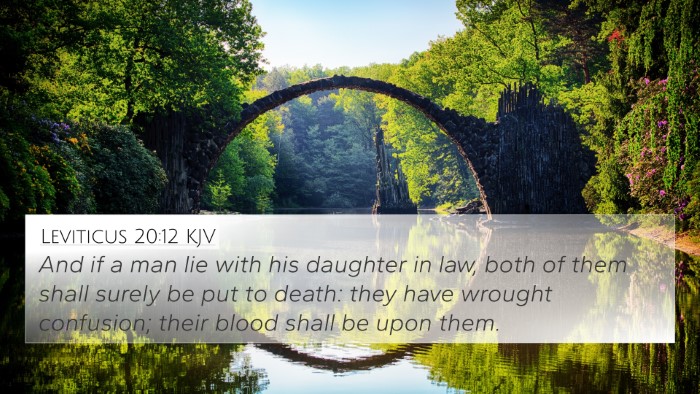Understanding Leviticus 18:15
Leviticus 18:15 states: "You shall not uncover the nakedness of your daughter-in-law; she is your son’s wife; you shall not uncover her nakedness." This verse addresses the prohibition of incestuous relationships, specifically banning a man from engaging in sexual relations with his daughter-in-law.
Summary of Commentaries
This verse has been interpreted in various ways by several biblical commentators, providing depth and understanding into its implications:
Matthew Henry's Commentary
Matthew Henry emphasizes that the rules set forth in Leviticus are designed to maintain holiness among God's people. He interprets this specific prohibition as part of God's order for family relations, intending to prevent moral corruption and social decay within the Israelite community. Henry asserts that such relations violate the sanctity of familial ties and detract from the dignity and respect due to marriage.
Albert Barnes' Notes
Albert Barnes explains that the law forbids the uncovering of nakedness in contexts that bring shame and degradation. He points out that this prohibition is part of a broader set of sexual ethics outlined in Leviticus, which aims to protect family integrity. Barnes also highlights that this command reflects a larger theme in the Bible regarding the sacredness of marital unions and the sanctity of familial relationships.
Adam Clarke's Commentary
Adam Clarke provides a thorough analysis of the implications of this verse. He notes that the term "uncover the nakedness" serves as a euphemism for sexual relations. Clarke underscores the importance of adhering to these regulations as a means of maintaining purity and moral standards, connecting physical actions with spiritual outcomes. He further draws attention to historical instances where failure to adhere to such laws resulted in societal consequences.
Cross-References
Leviticus 18:15 is interlinked with several other scripture passages, providing a comprehensive look at biblical ethical standards. Notable cross-references include:
- Genesis 38:11 - The story of Judah and Tamar, illustrating the complications of incestuous relationships.
- Deuteronomy 22:30 - Another prohibition against inappropriate sexual relations within the family.
- Leviticus 18:6-18 - A broader listing of sexual prohibitions, illustrating God’s parameters for sexual conduct.
- Romans 1:26-27 - Paul discusses sexual immorality, connecting with themes of purity and sanctity.
- Hebrews 13:4 - The writer underscores the importance of honoring marriage, linking back to the sanctity of the marital bond discussed in Leviticus.
- 1 Corinthians 5:1 - Here, Paul rebukes incestuous relationships within the church, showing the continued relevance of the Old Testament law.
- Exodus 20:14 - "You shall not commit adultery," reinforcing sexual fidelity as a key principle throughout scripture.
- Ephesians 5:3 - Paul advises against any form of sexual immorality, promoting holiness among believers.
Thematic Bible Verse Connections
This verse reflects a significant theme throughout the Bible concerning sexual ethics, family relationships, and the preservation of holiness. Not only does it provide a guideline within the context of ancient Israel, but it also resonates through New Testament teachings about moral purity. The connections between the Old and New Testament further illustrate how these principles evolve yet remain relevant for contemporary Christian living.
Tools for Bible Cross-Referencing
Understanding and interpreting Leviticus 18:15 can be enriched through using tools designed for Bible cross-referencing. These tools include:
- Bible Concordance: Enables locating specific terms and their occurrences throughout scripture.
- Bible Cross-Reference Guide: Assists in tracing themes and concepts across different biblical texts.
- Cross-Reference Bible Study: Provides insights into how various passages relate to one another.
- Bible Chain References: Guides readers through related verses in a logical flow.
- Bible Reference Resources: Include commentaries, academic works, and educational materials that deepen scriptural understanding.
Identifying Connections Between Old and New Testament
When studying Leviticus 18:15, it is vital to recognize the connections it has with both the Old and New Testament. Understanding these connections enhances comprehension and reveals the continuity of God’s moral expectations:
- Exploring how New Testament teachings on sexual morality resonate with Old Testament laws—confirming the continuous moral fabric of scripture.
- Evaluating how Paul’s epistles reflect on similar themes found in Leviticus, providing a comparative analysis of biblical ethics.
Detailed Cross-Reference Study
For in-depth study, one may employ various methods of cross-referencing biblical texts, such as:
- Utilizing a study Bible with built-in references to facilitate deeper connections.
- Engaging in thematic studies that explore concepts across the Bible, focusing on parallels related to family, morality, and divine order.
- Incorporating scholarly articles that juxtapose Old Testament law with New Testament principles, enhancing understanding of the interplay between both.
Conclusion
The study of Leviticus 18:15 provides deeper insights into the sanctity of marital relationships and the moral codes established by God. By utilizing tools for Bible cross-referencing, readers can uncover the connections between scripture passages, enriching their understanding of biblical teachings and their applications in everyday life. Engaging with commentaries also aids in grasping the historical and cultural context underlying this important biblical mandate.






